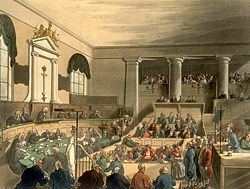Difference between revisions of "Court" - New World Encyclopedia
m |
|||
| Line 1: | Line 1: | ||
{{Claimed}} | {{Claimed}} | ||
| − | [[Category:Politics and social | + | [[Category:Politics and social sciences]] |
[[Category:Law]] | [[Category:Law]] | ||
| − | |||
| − | |||
| Line 32: | Line 30: | ||
See [[arbitration]]. | See [[arbitration]]. | ||
| − | |||
{{Expand-section|date=January 2007}} | {{Expand-section|date=January 2007}} | ||
| − | + | ||
==See also== | ==See also== | ||
===General=== | ===General=== | ||
Revision as of 16:29, 1 February 2007
- This article is about courts of law. For other uses of the term, see Court (disambiguation).

A court is a public forum used by a power base to adjudicate disputes and dispense civil, labour, administrative and criminal justice under its laws. In common law and civil law states, courts are the central means for dispute resolution, and it is generally understood that all persons have an ability to bring their claims before a court. Similarly, those accused of a crime have the right to present their defense before a court.
Court facilities range from a simple farmhouse for a village court in a rural community to huge buildings housing dozens of courtrooms in large cities.
Trial and appellate courts
Each state establishes a court system for the territory under its control. This system allocates work to courts or authorized individuals by granting both civil and criminal jurisdiction (in the United States, this is termed subject-matter jurisdiction). The grant of power to each category of court or individual may stem from a provision of a written constitution or from an enabling statute. In English law, jurisdiction may be inherent, deriving from the common law origin of the particular court. For this purpose, courts may be classified as trial courts (sometimes termed "courts of first instance") and appellate courts. Some trial courts may function with a judge and a jury: juries make findings of fact under the direction of the judge who makes findings of law and, in combination, this represents the judgment of the court. In other trial courts, decisions of both fact and law are made by the judge or judges. Juries are less common in court systems outside the Anglo-American common law tradition.
In a common law system, appellate courts may be arranged in a hierarchy and their function is to review the decisions of trial courts (and of lower appellate courts) and, generally, they only address questions of law, i.e. whether the lower courts interpreted and applied the law correctly, or procedure. These hearings do not usually involve considering factual matters unless new evidence has come to light. Such factual evidence as is admitted will only be considered for the purposes of deciding whether the case should be remitted to a first instance court for a retrial unless, in criminal proceedings, it is so clear that there has been a miscarriage of justice that the conviction can be quashed.
Personal jurisdiction
In the United States, a court must have personal jurisdiction over a defendant to hear a case brought by a plaintiff against that defendant. There are three kinds of personal jurisdiction: in personam jurisdiction, in rem jurisdiction, and quasi in rem jurisdiction. A detailed discussion of personal jurisdiction is beyond the scope of this article; however, personal jurisdiction (in the United States) generally refers to the legal sufficiency of the connection between the defendant and the forum (the U.S. state) in which the court is located. See e.g. Pennoyer v. Neff, see also Minimum contacts and International Shoe v. Washington.
Civil law courts and common law courts
The two major models for courts are the civil law courts and the common law courts. Civil law courts are based upon the judicial system in France, while the common law courts are based on the judicial system in Great Britain. In most civil law jurisdictions, courts function under an inquisitorial system. In the common law system, most courts follow the adversarial system. Procedural law governs the rules by which courts operate: civil procedure for private disputes (for example); and criminal procedure for violation of the criminal law.
Tribunal
See arbitration.
{{#invoke:Message box|ambox}}
See also
General
- Sanctions
- International judicial institution
- International Criminal Court
- List of people who have acted as their own attorney
Court terminology
- Adjudication
- Contempt of court
- Judicial economy
- Jurist
- Legal proceedings
- Quash
- Relevancy
- Rebuttal
- Subpoena
- Testimony
Types and organization of courts
- Appellate court
- Constitutional Court
- Court en banc
- Court of Faculties
- Court-martial
- Courts of England and Wales
- Ecclesiastical court
- Equity court
- Family court
- High Court of Justiciary
- Revolutionary Tribunal (French Revolution)
- Scots Law
- Scottish Courts Service
- Supreme court
- Trial court
External links
- US federal courts
- Directory of State Court websites
- Court TV (coverage of major US trials)
- Directory of local courts in the US
Credits
New World Encyclopedia writers and editors rewrote and completed the Wikipedia article in accordance with New World Encyclopedia standards. This article abides by terms of the Creative Commons CC-by-sa 3.0 License (CC-by-sa), which may be used and disseminated with proper attribution. Credit is due under the terms of this license that can reference both the New World Encyclopedia contributors and the selfless volunteer contributors of the Wikimedia Foundation. To cite this article click here for a list of acceptable citing formats.The history of earlier contributions by wikipedians is accessible to researchers here:
The history of this article since it was imported to New World Encyclopedia:
Note: Some restrictions may apply to use of individual images which are separately licensed.